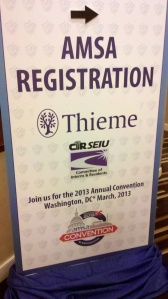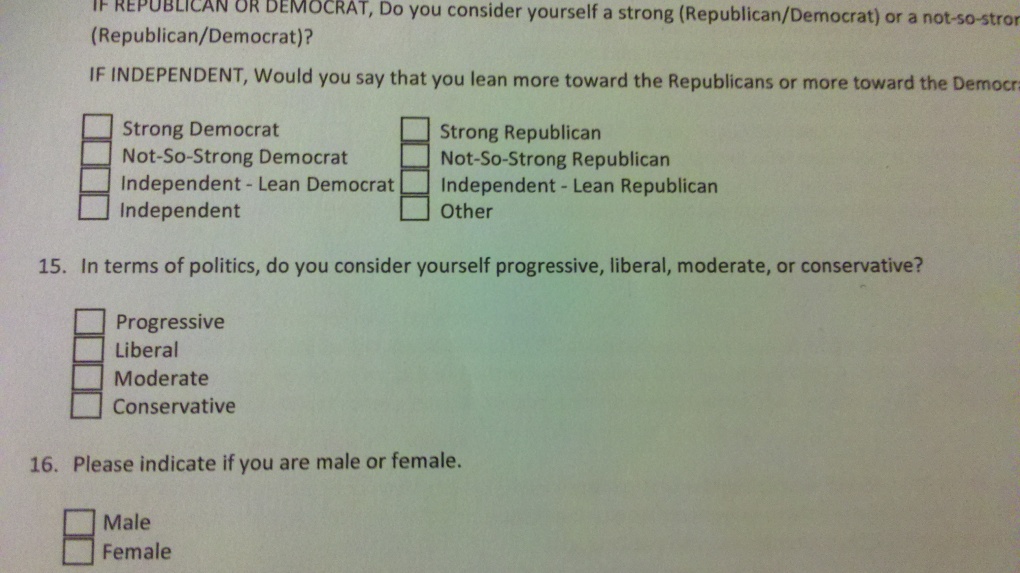Archive
AMSA Rodeo: And Now, a Word from Our Sponsors
For some time, there have been various efforts made to organize interns and residents under the auspices of a union. While I’m not aware of any hospital in the US with unionized physicians or trainee-physicians, that doesn’t mean there isn’t a union waiting for them… and for us at AMSA registration.

In our registration packets was a survey from SEIU-CIR asking about attitudes towards unionization. The demographic questions were quite entertaining. They clearly know what kind of medical student attends an AMSA convention.

"Translation: left wing, very left wing, very very left wing, or EEEVIILLL." I also note there's no option for "libertarian" or "Canadian."
Of course, seeing the SEIU logo brought to mind a recent chapter in the annals of medical unionization. I wonder how people here would feel about this one?
AMSA Follies: Swagalicious
I’ve alluded to AMSA’s… interesting choices regarding who they will and will not take money from (or at least, who they will claim not to take money from). Here’s the long-promised photographic evidence: the swag I collected from conference exhibitors.
What you’ll find below the cut includes:
- A pamphlet, a bag, and some pens from Medical Protective, a professional liability insurance company owned by Berkshire Hathaway.
- A Merck Manual (yes, that Merck… the one that makes all these ”pharms” of which AMSA claims to be ”free”).
- Materials from various academies of quackery (as seen earlier).
- A pen, a magnet, and some other swag from the FDA.
- Application forms for various forms of insurance/consumer credit provided by or through AMSA.
- Some stuff from banks.
- Swag NOS.
AMSA Follies: By Reader Demand
I was originally going to abandon any effort to post the remainder of my coverage of the American Medical Students Association’s 2011 annual convention when it become clear that it would be so delayed that it could hardly be considered topical. A small number of readers have encouraged me to post the highlight anyways, using the arguments: better late than never; the events left to be blogged were the most interesting; and finally, I may as well “complete the chronicle.”
Below the cut, for those interested in how health policy was presented at the AMSA convention, are highlights from two events: a debate between Michael Cannon (Cato Institute) and Robert Zarr (American Academy of Pediatrics, Physicians for a National Health Plan); and a later event featuring Walter Tsou (immediate past president, PNHP).
AMSA Follies: Primary Care and Health Policy
A pair of physician-researchers from an AAFP-funded research institute spoke about integrating a career in medicine with a career in policy research. That was interesting to me as a medical student, but of general policy interest was their take on the future of primary care:
- They were surprisingly genial about specialists, and avoided playing the blame and recrimination game. This was welcoming and refreshing. Medicine is divided enough as it is.
- They count Nurse Practitioners and Physician Assistants as primary care providers. I would think that this undermines their cause slightly (“hey, if non-physicians can do the job…”), but I’m sure they have their reasons.
- I overheard one of the speakers talking to a student in the hallway after the main presentation. I caught a bit of their discussion about Qliance. They were both of the opinion that that sort of market-based, patient-centred model will be important to revitalizing primary care. The AAFP speaker was trying to cram the Qliance model into the “ACO” box, but hey… no one’s perfect. It’s great to see some of the professional societies recognize the need to get off the government-dependence gravy train before it derails completely.
Also of note was the following… special moment: one of the students in the audience objected strenuously to the speakers’ use of “industrial,” “corporate” terms like — wait for it! — “supply,” “demand,” “surplus.” He wanted to know how the sky would keep from falling so long as we keep referencing “that paradigm.”
Oy.
AMSA Follies: Entrepreneurialism/Market Solutions *and* Social Justice?
Dr. Gloria Wilder, one of the “thought leaders” for this year’s AMSA convention, was introduced to us as someone who believes in “market solutions to social justice problems.” The program mentioned something about her being a fan of entrepreneurialism. Needless to say, I skipped out on the AAMC’s Chief Academic Officer to see what Dr. Wilder had on offer.
Turns out that it wasn’t quite what I was expecting. Silly me, expecting any sort of heterodoxy at an AMSA convention (besides the token non-liberal on one side of tomorrow’s policy debate).
I really wished that Dr. Wilder would have talked more about her business, Core Health and Wellness Centers. Aside from a throwaway mention of its $1 million+ profitability this year (treating mostly poor patients, at that!), and her lack of contempt for the wealthy, the talk was centered mostly on traditionally liberal conceptions of social justice (e.g. how the minimum wage ought to be higher, about how some have the temerity to claim that Medicaid might be associated with worse outcomes than uninsurance, how one might not want an all-mighty public sector union in Wisconsin, etc.).
Which is fine. Those are not unreasonable positions to hold, wrong though I may find them. What’s clear, however, is that Dr. Wilder does believe in an entrepreneurial manner of achieving the social justice goals that she advocates for. There was no mention of needing more grants, no mention of needing to beg government for more. At the end of the talk, she chided us not to be “robots” in “corporate (e.g. academic, government, managed care)” settings and instead to practice the sort of compassionate, patient-centred care we learn in medical school. That is an entrepreneurial vision. Unfortunately, when basic market principles and the idea of entrepreneurial are either foreign or anathema to many medical students here (see my Twitter feed for one egregious example), I would have been excited for her to take a stronger stand in favour of the market and entrepreneurial forces that she merely alluded to.
Unlike the conception of social justice that she shares with the majority here, those values (markets, entrepreneurialism) are in sore need of a strong defense at this conference. I can only do so much from the Internet!
AMSA Follies: The Upside
The conference isn’t all shenanigans that raise my ire (or at least my vehement disagreement). This morning’s keynote speaker, Marshall Ganz, is a professor at Harvard who took 31(!) years off from college to participate in the civil rights movement in the South, then the labour rights movement led by Cesar Chavez in California.
Highlights from his talk:
- “Leadership is the practice of accepting responsibility for enabling others to achieve a common purpose under uncertainty.” [Perhaps the best definition I’ve ever encountered.]
- Raising “awareness” and starting “dialogue” are rarely useful in situations where different parties have different goals. [something that my generation seems to forget, with the ease of meaningless “awareness” campaigns limited by Facebook/Twitter accessibility]
- The cause of Wisconsin public-sector unions and Egypt’s popular uprising are meaningfully similar/equivalent. [ooookaaaaaay]
- Some of the reasons for the success of the American conservative movement in recent decades are their ability to organize at the grass-roots (e.g. the National Rifle Association), to clearly articulate their values and principles, and their persistence. The left is unable to consistently do this.
Right now: the common purpose of the conference attendees is lunch and swag, with great certainty. Lots, lots, lots of swag to be had. There will be photos.





![notwithstandingblog at gmail [dot] com notwithstandingblog at gmail [dot] com](https://notwithstandingblog.files.wordpress.com/2010/04/contact.png) notwithstandingblog at gmail [dot] com
notwithstandingblog at gmail [dot] com
Some Friendly, Unsolicited Advice for PNHP
Physicians for a National Health Plan (PNHP), as the name suggests, is the biggest and best-known group of American physicians who support replacing the current health care system with a national single-payer. I used to be a big booster of this idea, but it doesn’t take much poking around this website to figure out that my feelings towards American single-payer reform have cooled considerably (to say the least).
I’ve been fortunate to attend a number of events run by senior PNHP officers at SUMS and at other venues (e.g. the AMSA conference back in March). At one of the more recent events, I had the privilege of speaking at length to some of their representatives at length. As you might expect, the resulting discussion was direct but cordial.
Though I disagree with their proposed policies, I do respect PNHP as an organization. It is one of the biggest mobilizers of physicians and medical students who are in favour of radically changing how American health care operates. Their passion is palpable at even the most informal event. They do have a contribution to make to the health policy conversation. Unfortunately, while there is an intellectually-coherent case to be made for single-payer (a mistaken case, in my view, but respectable and honest), I have yet to hear it from anybody at PNHP (n=small).
I harbour no illusions about my ability to persuade hard-core single-payer believers in a short blog post. I do, however, have some friendly and hopefully helpful advice on how to talk to the uninitiated and the un-converted more productively:
1) Don’t try to twist the data to support your case. It shows. At best, data on Medicare-vs.-private administrative costs are equivocal, cross-country infant mortality comparisons are spurious, life expectancy at birth captures a lot of mortality that is out of the hands of the healthcare system, and so on. The empirical case for single-payer superiority is thin gruel.
2) When someone asks whether you’d trust a Republican President and Congress to implement single-payer well, don’t duck the question. It’s a more important one than you seem to acknowledge. If you want to centralize control in government, be prepared to talk about how you will deal with your ideological opponents who tend to win elections every now and then.
3) Your moral argument is a lot stronger than your empirical argument. Why not make it explicit? Americans don’t tend towards collectivism, but neither are most people data-oriented policy wonks. Instead of making a weak case based on weak data, you should be prepared to talk about the moral strengths of single-payer relative to the alternatives. Where are the mentions of equity, obligation, and collectivism? (I ask this seriously, not passive-aggressively)
4) Be fluent in the language business, politics, and economics. When your executives are being matched point-for-point by medical students who majored in biochemistry and similar fields, you know you have a problem. If you’re going to call for the dismantling of private insurance, have some idea of how the sector actually operates. If you want to give control of the health system to government, be able to discuss the nuances of Washington power structures. Be able to respond to phrases like “deadweight loss,” “price-vs.-income problems,” and “underwriting” with more than a blank stare.
5) Anecdotes are rarely dispositive of policy questions. When someone points this out about anecdotes involving people you know, don’t get offended; this rarely advances discussion. When you introduce your friend’s problems to the debate, it’s not your opponent who’s trying to use them to score “cheap points.”
6) Milton Friedman is said to have told an up-and-coming Walter Williams, after the latter appeared on TV to discuss school choice, that “[Williams] was right about everything but [had] made one mistake […], when you talk about liberty, you have to smile.” You may not be talking about liberty as Friedman understood the term, but his advice is every bit as applicable.